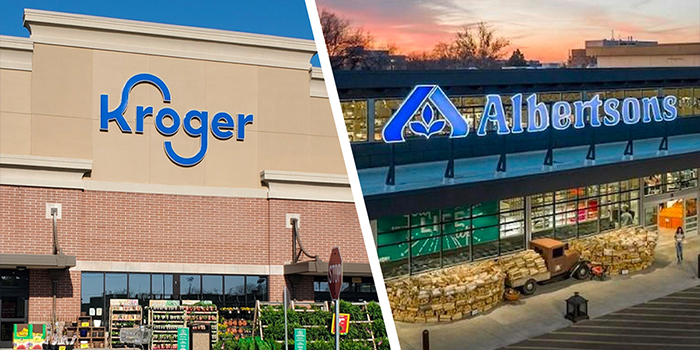Kroger/Albertsons: Parties Agree In Colo. To Put Mega-Merger on Hold

Kroger and Albertsons’ $24.6 billion grocery merger is once again in flux after a Colorado judge and the state’s attorneys general agreed today to an order halting the proceedings until the Colorado District Court rules on the state’s lawsuit that seeks to permanently block the deal. Until now, the grocery chains had maintained the deal would close in August.
At today’s hearing, Judge Andrew Luxen granted Colorado attorney general Philip Weiser’s request for a preliminary injunction which temporarily blocks the heavily scrutinized mega-merger. The agreement also cancels a nine-day hearing on the preliminary injunction set to start on August 12; instead it consolidates the proceeding with a two-week trial slated to begin on September 30.
“Based on the evidence presented by the state in its motion and the joint stipulation, the court finds there is reasonable probability that the state will prove its claims against defendants at trial,” said Judge Luxen in today’s order, as reported by the AZ Mirror and the Idaho Capital Sun. He is expected to publish the written order in the coming days.
Kroger previously requested that Judge Luxen cancel the August 12 hearing in Colorado entirely and agree to issue a final decision by November 8, per Law360. However, the judge refused to guarantee a ruling by any particular date and today’s move places the deal on indefinite hold, to be dictated by the timeline of the upcoming court proceedings; the agreement mandates that Kroger and Albertsons will wait five days until after a final ruling to close the deal, assuming it is not blocked.
Colorado’s lawsuit was filed by Weiser in February and backed by the U.S. Department of Justice (DOJ) in May. The state’s challenge to the merger is based on Colorado’s own antitrust laws, versus the federal government’s and, in a filing in Denver district court, the DOJ said that federal antitrust law doesn’t “preclude parallel state laws” in protecting public interests.
The suit is separate from that of the Federal Trade Commission (FTC), which was joined by eight state attorneys general in addition to Washington, D.C., when it was filed in February.
“I am pleased that Kroger and Albertsons agreed to halt their plans to merge until the court rules on the state’s lawsuit […] this is great news for shoppers, workers, farmers and other suppliers, who can rest assured that this mega-merger will not go into effect during harvest season and while kids are headed back to school,” said Weiser in a statement released today.
With the deal’s closing down to the wire, the move today will allow prosecutors and the grocers to take a breath, but for the latter, only momentarily.
The delay comes only weeks after an administrative judge hit pause on the FTC’s in-house case in order to allow the defendants to handle the antitrust conflicts in Colorado and Washington state in addition to the FTC’s federal suit in an Oregon court.
The case in Oregon is a key reason why Kroger and Albertsons were dogged to delay the Colorado hearing, which would have overlapped with the beginning of their federal court proceedings on August 26. Another trial against the deal in Washington state is still scheduled for September 16.
The federal suit, in which regulators are requesting a preliminary injunction, has the power to put the deal on hold until the FTC concludes its in-house proceedings.
Most recently, that in-house case sought to bar Kroger and Albertsons from using their divestiture plan, currently their main defense, at all during the proceedings unless they shared privileged documents with federal regulators. Earlier this month, Kroger and Albertsons published their full divestiture plan, which includes selling 579 stores to C&S Wholesale.
“[Today’s] agreement saves both Albertsons and Kroger and the state of Colorado from expending resources fighting about a stay whenever everyone knows full well that there’s going to have to be a trial to determine whether the merger should be permitted,” said Kirk McGill, special counsel at Denver-based Hall Estill. “So this appears to be a reasonable and sensible step by all involved. Critically, the court did not make any finding about the merits of the arguments against the merger.”

















